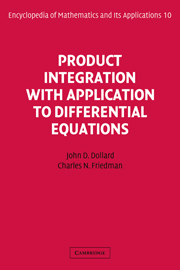Book contents
- Frontmatter
- Contents
- Editor's Statement
- Section Editor's Foreword
- Preface
- Introduction
- Product Integration with Applications to Differential Equations
- Chapter 1 Product Integration of Matrix-Valued Functions
- Chapter 2 Contour Product Integration
- Chapter 3 Strong Product Integration
- Chapter 4 Applications
- Chapter 5 Product Integration of Measures
- Chapter 6 Complements; other Work and further Results on Product Integration
- Appendix I Matrices
- Appendix II The Place of Multiplicative Integration in Modern Analysis
- Index
- About the authors
Chapter 3 - Strong Product Integration
Published online by Cambridge University Press: 05 June 2013
- Frontmatter
- Contents
- Editor's Statement
- Section Editor's Foreword
- Preface
- Introduction
- Product Integration with Applications to Differential Equations
- Chapter 1 Product Integration of Matrix-Valued Functions
- Chapter 2 Contour Product Integration
- Chapter 3 Strong Product Integration
- Chapter 4 Applications
- Chapter 5 Product Integration of Measures
- Chapter 6 Complements; other Work and further Results on Product Integration
- Appendix I Matrices
- Appendix II The Place of Multiplicative Integration in Modern Analysis
- Index
- About the authors
Summary
Introduction
This chapter stands at a higher level of abstraction than those that have preceded it. Some familiarity with the theory of Banach spaces is presupposed. In particular, the reader is assumed to be familiar with the various standard topologies on the set of bounded linear operators on a Banach space (norm topology, strong topology, and weak topology). For background material, we refer the reader to any standard text on functional analysis, for example, [KY3].
The situation to be considered in this chapter is as follows: X is a Banach space over the complex numbers and A is a function defined on the real interval [a, b] and taking values in the set B(X) of all bounded linear operators from X to itself. The problem will be to define the product integral of A and establish properties analogous to those found in Chapter 1 for product integrals of matrix-valued functions. As we shall see, for certain types of functions A the work of Chapter 1 generalizes directly. For other types the generalization is not so immediate and will require a considerable development.
In the last section of this chapter, we shall consider a problem involving unbounded operators.
Notation and Terminology
If φ is an element of the Banach space X, then ∥φ∥ denotes the norm of φ. X* denotes the dual of X (all bounded linear maps from X to ℂ).
- Type
- Chapter
- Information
- Publisher: Cambridge University PressPrint publication year: 1984
- 2
- Cited by

